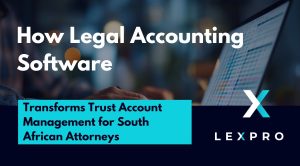Key Takeaways |
|
• South African law firms must submit trust account audit reports within 6 months of their financial year-end to the Legal Practice Council |
|
• Modern legal software can automate record-keeping, reducing human error and boosting productivity through continuous audit readiness |
|
• Integrated accounting systems provide real-time tracking and comprehensive audit trails with cost-effective ease of use |
|
• Digital payment systems with built-in verification features significantly reduce fraud risk whilst enabling work from anywhere capabilities |
|
•Technology solutions can transform the stressful annual audit process into a streamlined, efficient experience |
Introduction
The annual audit deadline looms like a storm cloud over many South African law firms. The auditor of a legal practitioner’s trust account must ensure that they furnish the Council with an audit report within 6 months of the financial year end, yet for many firms, this six-month window feels impossibly short when faced with disorganised records and manual processes.
In many instances, legal practitioners consider the requirement for an annual audit as a cumbersome and expensive annual requirement, imposed on them by the regulator through legislation, which contributes to significant anxiety, stress, and anger. However, what if technology could transform this dreaded annual ordeal into a seamless, stress-free process?
The reality is that modern legal software solutions can automate record-keeping, maintain continuous audit trails, and ensure your firm remains audit-ready throughout the year. Instead of scrambling to prepare documents and reconcile accounts when audit season arrives, technology enables you to maintain pristine records that auditors can review with confidence.
Understanding South Africa’s Legal Audit Landscape
The regulatory environment for South African law firms continues to evolve with increasingly rigorous standards. Legal practitioners must maintain specific documentation requirements throughout the year to meet the stringent standards that firms must adhere to.
The Legal Practice Council requires specific documentation, including the Attorney’s Annual Statement on Trust Account, which must contain representations and information from trust accounting records. This comprehensive reporting demands accurate record-keeping throughout the year, not just during audit preparation.
For firms with February financial year-ends, audit reports must typically be submitted by August. These consistent deadlines make year-round preparation crucial for cost-effective productivity and avoiding penalties.
How Technology Transforms Audit Preparation
Automated Record-Keeping and Documentation
Traditional audit preparation involves months of manual reconciliation, document gathering, and error correction. Modern legal accounting software eliminates these pain points through cost-effective automation that maintains continuous documentation throughout the year. Systems can automatically flag discrepancies, ensure proper segregation of client funds, and maintain detailed transaction logs that auditors require.
Lexpro Accounting exemplifies this approach with purpose-built features for South African legal practices. The software automatically handles trust account management, Section 86(4) investments, and trust-to-business transfers whilst maintaining the comprehensive audit trails that regulators demand.
Real-Time Financial Oversight
Rather than discovering issues during year-end preparation, integrated systems provide real-time visibility into your firm’s financial health. Bank statement imports, automated reconciliations, and instant reporting capabilities mean potential problems are identified and resolved immediately, not months later when auditors arrive.
The software generates trial balances, age analyses, and financial statements on demand, transforming what was once a time-consuming manual process into an instant digital procedure. This capability proves invaluable when auditors request specific reports or need to verify particular transactions.
Enhanced Security and Fraud Prevention
Legal practitioners hold a high level of trust with their clients and are perceived as trustworthy in the eyes of the public. This trust extends to financial management, making robust security measures essential. Modern payment systems incorporate advanced verification features that prevent fraudulent transfers whilst maintaining detailed logs of all authorisations.
Lexpro Payments addresses these concerns through secure digital certifications, bank account verification, and multi-level approval processes. These features not only prevent fraud but also create the comprehensive documentation trail that auditors need to verify compliance.
Streamlining Document Management and Reporting
Comprehensive Record Keeping
Manual document management creates significant audit risks. Papers go missing, digital files become corrupted, and crucial information gets overlooked. Integrated legal software maintains all financial documentation in secure, searchable databases with automatic backup systems.
Every transaction generates supporting documentation that’s immediately accessible to authorised personnel. Whether auditors need to trace a specific client payment or verify trust account transfers, the information is available instantly through sophisticated search functions.
Streamlined Information Provision
The Legal Practice Council requires specific reporting formats, and modern systems ensure all necessary information is readily available to support auditors in preparing the required reports. Rather than spending weeks gathering scattered information, integrated systems provide comprehensive data access that auditors need to compile their findings efficiently.
These capabilities extend beyond basic financial information to include detailed analytics about firm performance, client account management, and regulatory status. Such insights prove valuable not only for audit purposes but also for strategic business decisions, enhancing overall productivity.
Integration Across Practice Areas
Lexpro Litigation & Debt Collection demonstrates how integrated systems benefit audit preparation. Rather than maintaining separate systems for case management and accounting, integrated platforms ensure that financial transactions automatically flow into the appropriate accounting records with proper documentation and approval trails.
This integration eliminates the reconciliation headaches that plague firms using multiple disconnected systems. Auditors can easily trace transactions from their source through to final accounting treatment, significantly reducing the time required for verification procedures.
Preparing for Your Annual Audit
Establishing Continuous Readiness
The key to successful audit outcomes lies in maintaining readiness throughout the year rather than attempting to achieve it during audit preparation. Modern legal software enables this approach through automated monitoring, real-time reporting, and comprehensive documentation management with remarkable ease of use.
Firms should implement systems that provide continuous oversight of trust account balances, automatic flagging of irregularities, and regular management reporting. This proactive approach ensures that problems are identified and resolved promptly, preventing the accumulation of issues that create audit complications.
Staff Training and System Utilisation
Technology is only effective when properly utilised. Firms must invest in comprehensive staff training to ensure that team members understand system capabilities and use them effectively. This investment pays dividends during audit season when well-maintained records facilitate smooth audit procedures.
Regular system updates and maintenance ensure that software continues to meet evolving regulatory requirements whilst providing the functionality that busy legal practices need.
Building Auditor Relationships
Modern legal software facilitates better relationships with audit firms through improved documentation, faster information provision, and more accurate records. When auditors can access the information they need quickly and confidently, audit procedures become more efficient and cost-effective.
FAQ
How far in advance should law firms begin preparing for their annual audit?
With proper legal software implementation, audit preparation becomes a continuous process rather than an annual scramble. However, firms should begin specific audit preparation at least three months before their deadline to ensure adequate time for any issues that arise. Modern systems significantly reduce this preparation time by maintaining audit-ready records throughout the year.
What are the most common audit issues that technology can prevent?
Technology prevents common issues including trust account reconciliation errors, missing transaction documentation, inadequate segregation of client funds, incomplete audit trails, and mathematical errors in financial reports. Automated systems also prevent the documentation gaps that often occur with manual record-keeping processes.
Can legal software help with audit costs?
Absolutely. Well-organised, technology-maintained records significantly reduce audit time and complexity, leading to lower audit fees. Additionally, the continuous monitoring prevents costly regulatory issues and penalties that might otherwise arise from manual record-keeping errors. The cost-effective nature of modern legal software delivers excellent productivity gains that more than justify the investment.
Conclusion
The annual audit deadline doesn’t have to trigger anxiety and sleepless nights for South African law firms. By implementing comprehensive legal technology solutions, firms can transform their audit process from a dreaded annual ordeal into a streamlined validation of their already-organised operations.
Modern legal software provides the automated record-keeping, real-time financial oversight, and comprehensive documentation that auditors require with exceptional ease of use and cost-effective efficiency. These systems eliminate the manual errors and documentation gaps that create audit complications whilst providing the detailed records that demonstrate regulatory adherence.
Bottom Line: Technology isn’t just making audits easier—it’s making them obsolete as stressful events. Firms that embrace comprehensive legal software solutions find that audits become routine validations of their already-excellent record-keeping rather than investigations into potentially problematic practices.
Don’t let another audit season catch your firm unprepared. Transform your financial management processes with Lexpro’s comprehensive legal software solutions. Contact us today or call 012 345 4510 to discover how our technology can revolutionise your audit experience. Visit us at 118 Sovereign Dr, Route 21 Business Park, Centurion, 0157 or book your free demonstration to see the difference proper legal software makes.








